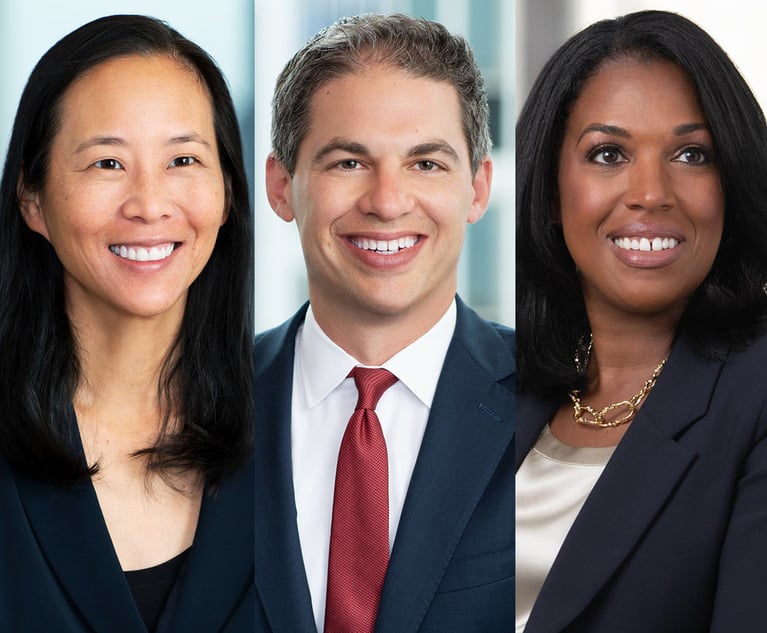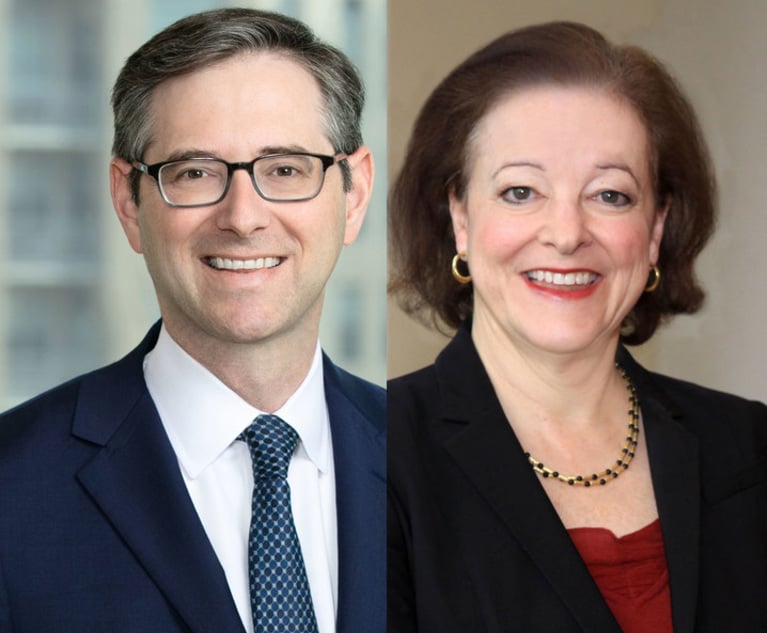 Mark Wasserman of Eversheds Sutherland. Photo: John Disney/ALM
Mark Wasserman of Eversheds Sutherland. Photo: John Disney/ALMEversheds Sutherland Rolls Out Konexo Legal Services Subsidiary in the US
The firm set a $127 million annual revenue target for the international side of the venture when it launched last year, but it's taking a wait-and-see approach stateside.
June 11, 2020 at 05:00 AM
4 minute read
Eversheds Sutherland is formally rolling out subsidiary Konexo, its alternative legal services provider, in the U.S., almost a year after unveiling the service in the U.K. and Asia.
Carmen Brun, who previously served as counsel in the firm's securities enforcement and litigation practice, will lead Konexo's U.S. operations. Stateside offerings will include litigation services, investigations and due diligence work, and contract analysis.
"The global pandemic has only accelerated the need for in-house legal departments to do more with less," Brun said. "Because of COVID-19, there's more demand for a business like Konexo, especially a business that's powered by a sophisticated global law practice like Eversheds."
Brun gave the example of contract analysis, where businesses see the value of using technology to assess wide portfolios of contracts and identify such provisions as force majeure and term clauses.
Brun, who is based in Washington, D.C., has spent 16 years at Eversheds. Before her legal career, she spent a dozen years in the hotel industry, including 11 as the general manager at the former Crowne Plaza at the United Nations in New York City.
"I'll be using my business background and my legal skills," she said of her new role.
When Eversheds unveiled Konexo in the U.K. and Asia in 2019, the firm said it was aiming for long-term revenues of at least £100 million, or nearly $127 million. That impressive target is aided by the fact that the international product is the result of the combination of several existing businesses—advisory, interim resourcing and managed service offerings, as well as flexible lawyering—that have been bringing in significant revenue since being created roughly a decade ago.
"We're not setting any revenue goals. If it's in the millions, that's great. If not, that's fine too," said Eversheds co-CEO Mark Wasserman, who's based in Atlanta. "At the end of this year we'll have some experience, and we'll think about how to do that for 2021."
But Wasserman said that the service has already seen a soft launch in the U.S. One example is a significant internal investigation. Without Konexo, the firm's white-collar lawyers would be handling the work. But the firm would be turning to an outside provider for document review and other ancillary activities.
"Now we can keep it under control for the client," he said. "On a communications basis, there's one tech platform. That's much more efficient. On the price point, it's better too."
Wasserman said last week that the firm was currently working on a soft, nonphased return to the office for some people, but he expected many clients to be working remotely through Labor Day, or the foreseeable future.
"The fact that everyone is going to be working in more of a decentralized fashion going forward is going to make this more impactful for certain clients and more impactful for us than it would have been before the pandemic," he said. "I think the openness many lawyers everywhere have to getting work done with people who might be sitting in different states or countries is greater than ever."
The firm announced in early May that it would be reducing compensation for U.S. lawyers and staff by 10% on average and furloughing about 40 staff members. It also delayed the start date for its first-year associate class from the fall to January 2021, and said it would hold a truncated remote summer program for its roughly 20 U.S. law students.
|Read More
Two Law Firm Subsidiaries Stand Out as Clients Embrace Alternatives
This content has been archived. It is available through our partners, LexisNexis® and Bloomberg Law.
To view this content, please continue to their sites.
Not a Lexis Subscriber?
Subscribe Now
Not a Bloomberg Law Subscriber?
Subscribe Now
NOT FOR REPRINT
© 2025 ALM Global, LLC, All Rights Reserved. Request academic re-use from www.copyright.com. All other uses, submit a request to [email protected]. For more information visit Asset & Logo Licensing.
You Might Like
View All


Fenwick and Baker & Hostetler Add DC Partners, as Venable and Brownstein Hire Policy Advisers
2 minute read
After Nearly 2 Decades in the Role, Longtime Haynes and Boone General Counsel Passes the Baton
3 minute readLaw Firms Mentioned
Trending Stories
- 1Adapting to AI and the Needs of Lawyers Will Be Key For Shutts & Bowen, Says Incoming Ft. Lauderdale Leader
- 2What Qualities Will Distinguish Good from Great Service In 2025?
- 3The Met Hires GC of Elite University as Next Legal Chief
- 4Not Here: Court Finds Texas Has No Jurisdiction Over Google
- 5Lawyer's Retirement Benefits Excluded From Marital Property
Who Got The Work
Michael G. Bongiorno, Andrew Scott Dulberg and Elizabeth E. Driscoll from Wilmer Cutler Pickering Hale and Dorr have stepped in to represent Symbotic Inc., an A.I.-enabled technology platform that focuses on increasing supply chain efficiency, and other defendants in a pending shareholder derivative lawsuit. The case, filed Oct. 2 in Massachusetts District Court by the Brown Law Firm on behalf of Stephen Austen, accuses certain officers and directors of misleading investors in regard to Symbotic's potential for margin growth by failing to disclose that the company was not equipped to timely deploy its systems or manage expenses through project delays. The case, assigned to U.S. District Judge Nathaniel M. Gorton, is 1:24-cv-12522, Austen v. Cohen et al.
Who Got The Work
Edmund Polubinski and Marie Killmond of Davis Polk & Wardwell have entered appearances for data platform software development company MongoDB and other defendants in a pending shareholder derivative lawsuit. The action, filed Oct. 7 in New York Southern District Court by the Brown Law Firm, accuses the company's directors and/or officers of falsely expressing confidence in the company’s restructuring of its sales incentive plan and downplaying the severity of decreases in its upfront commitments. The case is 1:24-cv-07594, Roy v. Ittycheria et al.
Who Got The Work
Amy O. Bruchs and Kurt F. Ellison of Michael Best & Friedrich have entered appearances for Epic Systems Corp. in a pending employment discrimination lawsuit. The suit was filed Sept. 7 in Wisconsin Western District Court by Levine Eisberner LLC and Siri & Glimstad on behalf of a project manager who claims that he was wrongfully terminated after applying for a religious exemption to the defendant's COVID-19 vaccine mandate. The case, assigned to U.S. Magistrate Judge Anita Marie Boor, is 3:24-cv-00630, Secker, Nathan v. Epic Systems Corporation.
Who Got The Work
David X. Sullivan, Thomas J. Finn and Gregory A. Hall from McCarter & English have entered appearances for Sunrun Installation Services in a pending civil rights lawsuit. The complaint was filed Sept. 4 in Connecticut District Court by attorney Robert M. Berke on behalf of former employee George Edward Steins, who was arrested and charged with employing an unregistered home improvement salesperson. The complaint alleges that had Sunrun informed the Connecticut Department of Consumer Protection that the plaintiff's employment had ended in 2017 and that he no longer held Sunrun's home improvement contractor license, he would not have been hit with charges, which were dismissed in May 2024. The case, assigned to U.S. District Judge Jeffrey A. Meyer, is 3:24-cv-01423, Steins v. Sunrun, Inc. et al.
Who Got The Work
Greenberg Traurig shareholder Joshua L. Raskin has entered an appearance for boohoo.com UK Ltd. in a pending patent infringement lawsuit. The suit, filed Sept. 3 in Texas Eastern District Court by Rozier Hardt McDonough on behalf of Alto Dynamics, asserts five patents related to an online shopping platform. The case, assigned to U.S. District Judge Rodney Gilstrap, is 2:24-cv-00719, Alto Dynamics, LLC v. boohoo.com UK Limited.
Featured Firms
Law Offices of Gary Martin Hays & Associates, P.C.
(470) 294-1674
Law Offices of Mark E. Salomone
(857) 444-6468
Smith & Hassler
(713) 739-1250









